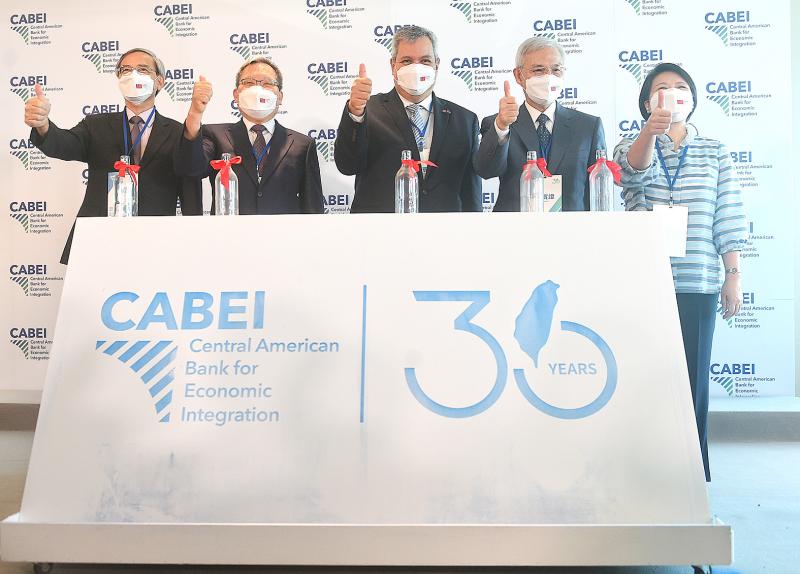Taiwan would emerge unscathed from China’s retaliatory actions to protest US House of Representatives Speaker Nancy Pelosi’s visit to Taipei, top monetary and financial officials said yesterday.
Central bank Governor Yang Chin-long (楊金龍) shrugged off unease over potential instability in the foreign exchange and stock markets after foreign portfolio funds trimmed their holdings of local shares for two straight days amid Beijing’s threats of retaliation.
“There is no need to worry,” Yang said on the sidelines of an event to celebrate the first anniversary of the opening of Central American Bank for Economic Integration’s (CABEI) Taipei office and the 30th anniversary of Taiwan becoming a member of CABEI.

Photo: Chang Chia-ming, Taipei Times
Taiwan has sufficient foreign exchange reserves to rein in unexpected and abnormal developments, Yang said when asked to comment on the currency market.
The New Taiwan dollar yesterday closed up 0.06 percent at NT$29.990 versus the US dollar in Taipei trading amid a normal trading volume of US$926 million.
Yang said the recent selling of local shares by foreign institutional players was “typical” for this time of the year.
Foreign portfolio managers tend to wire cash dividends abroad in August, putting depreciation pressure on the NT dollar.
Minister of Finance Su Jain-rong (蘇建榮) said China’s ban on imports of citrus fruit and two types of fish from Taiwan would have a very limited effect on the nation’s overall export figures.
China’s customs agency on Monday night imposed temporary import bans on more than 100 Taiwanese food brands, including I-Mei Foods Co (義美食品), Wei Chuan Foods Corp (味全食品) and Kuo Yuan Ye Foods Co (郭元益食品).
China and Hong Kong accounted for 25 percent of processed food exports in the first six months of this year, down from 43 percent in previous years, as local suppliers expanded export markets, Su told reporters at the CABEI event.
Processed food bound for the two markets amounted to US$240 million a year, or only 0.1 percent of total exports, Su said.
Similarly, China’s suspension of natural sand exports to Taiwan would cause little inconvenience, as local construction projects rely mostly on domestically sourced sand, Su said, adding that most China-sourced sand is sea sand that cannot be used in construction projects.
The American Chamber of Commerce in Taiwan said in a statement that it appreciated the extra support and interest from US officials in backing Taiwan.
While official visits carry important symbolic meaning, the chamber’s 71-year history has demonstrated how the peaceful pursuit of commerce contributes to prosperity and innovation on a regional and global level, the chamber said.
“We believe that further investment in the US-Taiwan economic relationship remains the best course to ensure the continuation of this progress,” it said.
The US and Taiwan are uniquely equipped to tackle challenges and opportunities, from public health, semiconductors, digital, and supply chain resilience to the development of sustainable sources of energy and talent, it said.

SEEKING CLARITY: Washington should not adopt measures that create uncertainties for ‘existing semiconductor investments,’ TSMC said referring to its US$165 billion in the US Taiwan Semiconductor Manufacturing Co (TSMC, 台積電) told the US that any future tariffs on Taiwanese semiconductors could reduce demand for chips and derail its pledge to increase its investment in Arizona. “New import restrictions could jeopardize current US leadership in the competitive technology industry and create uncertainties for many committed semiconductor capital projects in the US, including TSMC Arizona’s significant investment plan in Phoenix,” the chipmaker wrote in a letter to the US Department of Commerce. TSMC issued the warning in response to a solicitation for comments by the department on a possible tariff on semiconductor imports by US President Donald Trump’s

The government has launched a three-pronged strategy to attract local and international talent, aiming to position Taiwan as a new global hub following Nvidia Corp’s announcement that it has chosen Taipei as the site of its Taiwan headquarters. Nvidia cofounder and CEO Jensen Huang (黃仁勳) on Monday last week announced during his keynote speech at the Computex trade show in Taipei that the Nvidia Constellation, the company’s planned Taiwan headquarters, would be located in the Beitou-Shilin Technology Park (北投士林科技園區) in Taipei. Huang’s decision to establish a base in Taiwan is “primarily due to Taiwan’s talent pool and its strength in the semiconductor

An earnings report from semiconductor giant and artificial intelligence (AI) bellwether Nvidia Corp takes center stage for Wall Street this week, as stocks hit a speed bump of worries over US federal deficits driving up Treasury yields. US equities pulled back last week after a torrid rally, as investors turned their attention to tax and spending legislation poised to swell the US government’s US$36 trillion in debt. Long-dated US Treasury yields rose amid the fiscal worries, with the 30-year yield topping 5 percent and hitting its highest level since late 2023. Stocks were dealt another blow on Friday when US President Donald

UNCERTAINTY: Investors remain worried that trade negotiations with Washington could go poorly, given Trump’s inconsistency on tariffs in his second term, experts said The consumer confidence index this month fell for a ninth consecutive month to its lowest level in 13 months, as global trade uncertainties and tariff risks cloud Taiwan’s economic outlook, a survey released yesterday by National Central University found. The biggest decline came from the timing for stock investments, which plunged 11.82 points to 26.82, underscoring bleak investor confidence, it said. “Although the TAIEX reclaimed the 21,000-point mark after the US and China agreed to bury the hatchet for 90 days, investors remain worried that the situation would turn sour later,” said Dachrahn Wu (吳大任), director of the university’s Research Center for